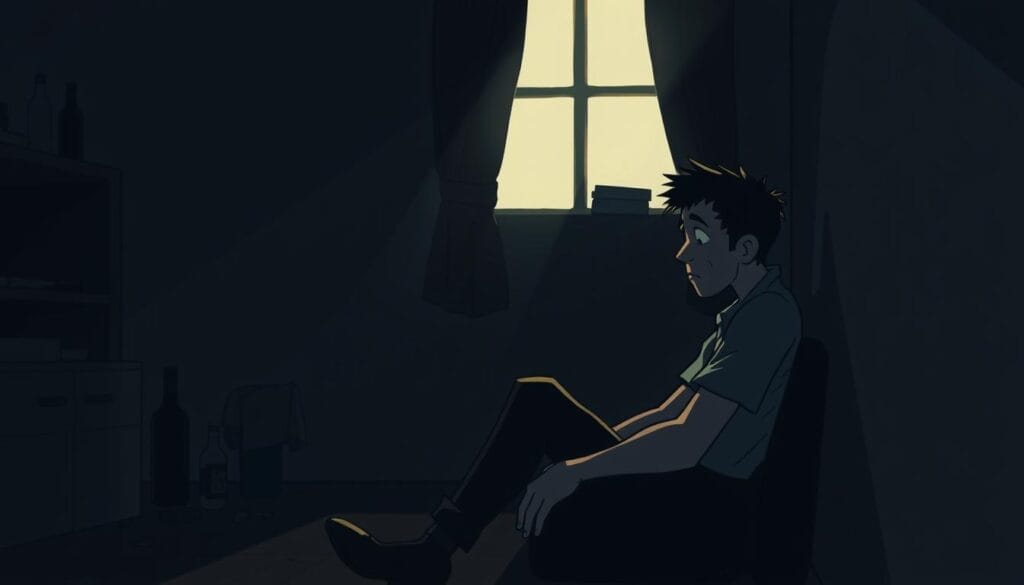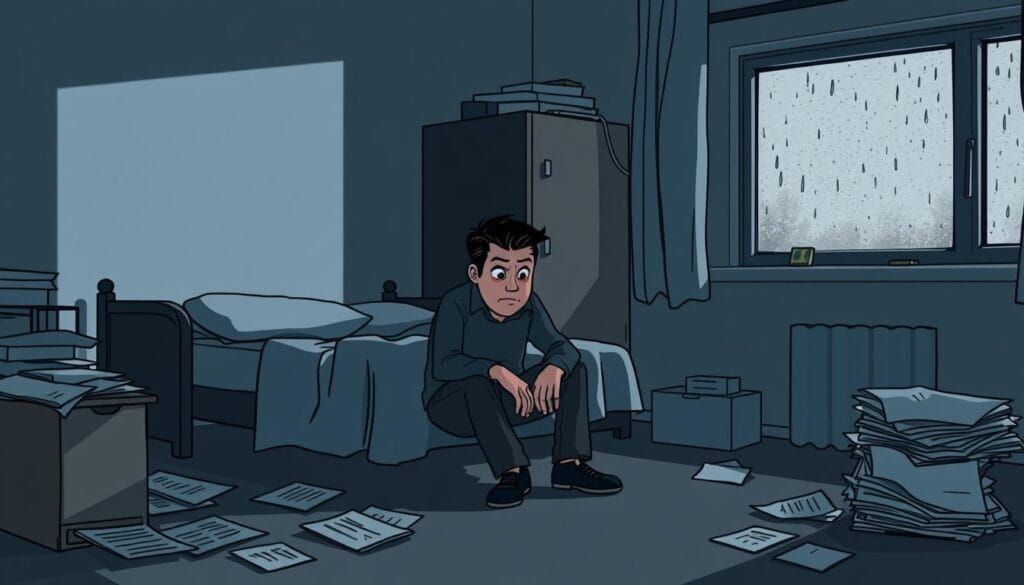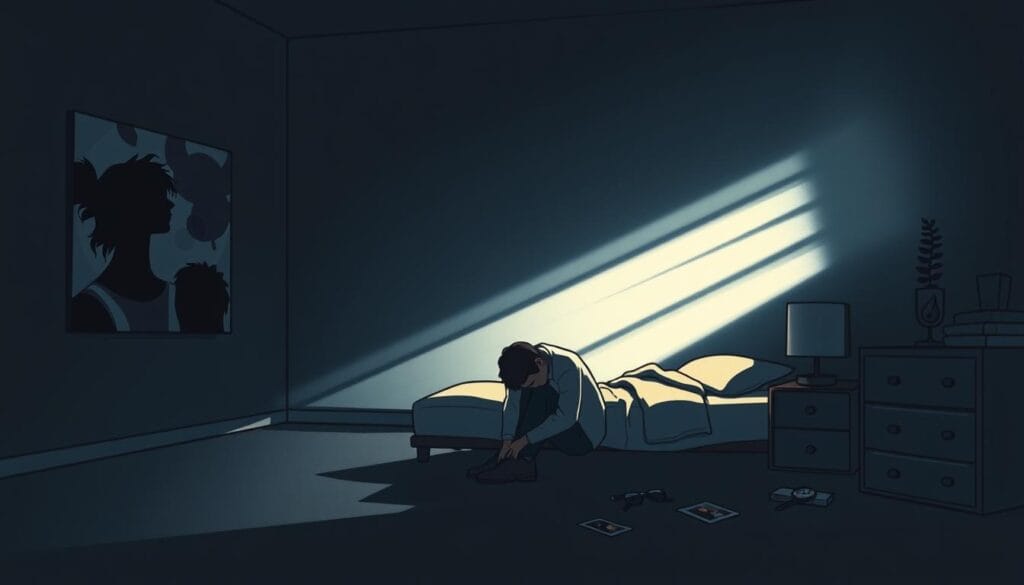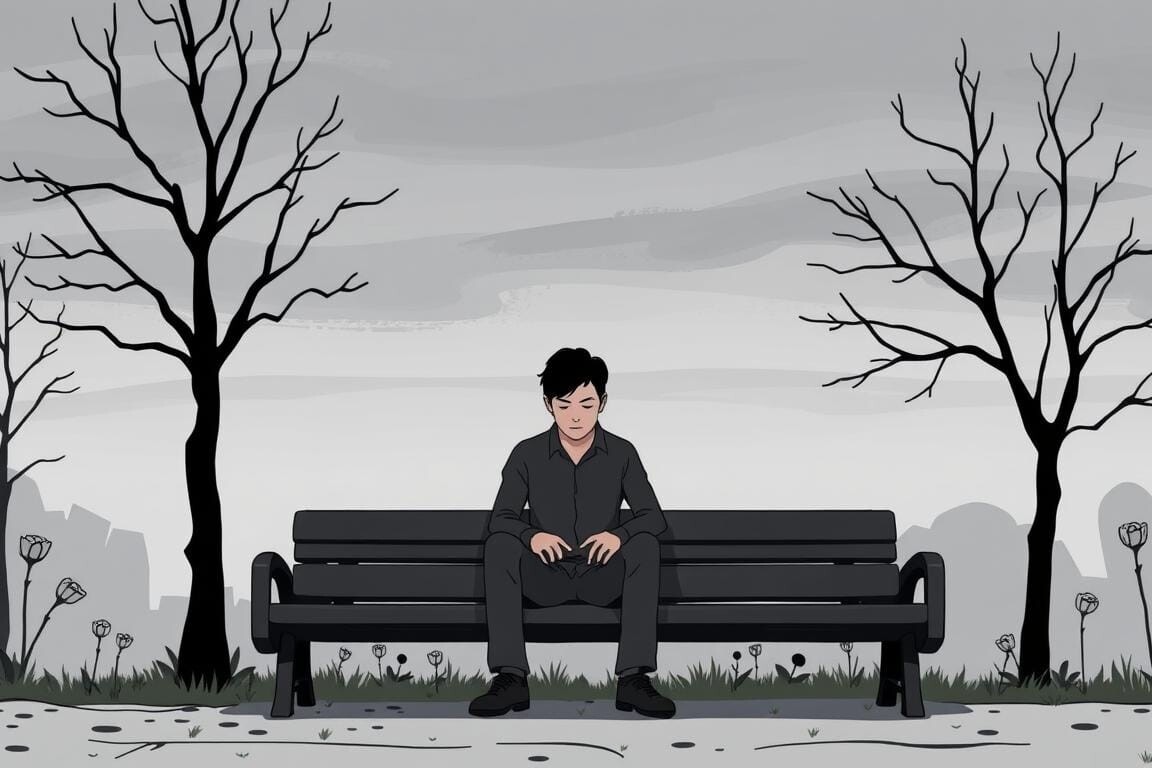Depression is a serious mental health issue that affects both men and women. But it shows up differently in men. Dr. Chandril Chugh, a top mental health expert, talks about the signs of depression in men that are often missed.
In this detailed article, we’ll look at the special signs of depression in men. We’ll also cover the risk factors and causes. Knowing the signs of depression in men helps us support them better. It encourages them to get the help they need, improving their health.
Table of Contents
ToggleUnderstanding Depression in Men
Depression is a serious mental health issue that affects many people. It shows up differently in men than in women. Knowing how depression looks in men is key to spotting it early and helping them.
Defining Depression and Its Unique Manifestations in Men
Depression makes people feel sad and hopeless for a long time. In men, it can show up as tiredness, headaches, or stomach problems. Men might also act out more, use drugs, or get angry easily.
Dr. Chandril Chugh says over 6 million men in the U.S. deal with depression every year. Sadly, men are more likely to take their own lives, making up 75% to 80% of all suicides in the U.S.
Men are often expected to be strong and not show their feelings. This can make depression harder to see in them. Work stress, retirement, and past traumas also play a big role.
Knowing how depression looks in men helps doctors, family, and friends to spot it. This is important for helping men and lowering the number of suicides among them.
Recognizing the Signs of Depression in Men
It’s important to spot depression in men early. Men often show depression in their own way. Knowing these signs helps loved ones and doctors help them.
- Physical symptoms: Changes in sleep, unexplained aches, and low energy are signs of depression in men.
- Emotional changes: Feeling sad, irritable, and unmotivated are common signs of depression in men.
- Behavioral shifts: Taking more risks, using substances, and pulling away from friends can mean depression.
By noticing these signs, you can help your loved one or patient get the right help. Understanding the link between depression and suicide is also key to preventing tragedy.
Depression is treatable, and men can get better with the right support. If you or someone you know is struggling, get help. We can all work together to make sure everyone gets the care they need.
Physical Symptoms of Depression in Men
Depression in men can show up in physical ways that are easy to miss. Dr.Chugh says men with depression might feel tired, have headaches, or have stomach problems. They might also sleep too much or too little.
These signs can be the only clue that a man is depressed. This can lead to a long wait before he gets help. It’s important for doctors to know how physical signs and depression are linked in men.
- About 9% of men in the U.S. feel depressed or anxious every day. Thirty-six percent have felt depressed at some point in their lives.
- Depression hits 5.5% of men, but 10.4% of women. Yet, four times as many men die by suicide as women.
- Men with depression might have headaches, tight chests, or pain in their joints or back. They might also have stomach issues, feel very tired, or have trouble sleeping.
Doctors can spot these signs to help men with depression. By focusing on these physical symptoms, they can improve mental health for men.
Emotional and Behavioral Signs
Depression in men shows up in many ways, not just physical signs. It also affects their emotions and behavior. Spotting these changes is key to helping them get better.
Emotional Manifestations of Depression in Men
Men with depression often feel sad, irritable, and unmotivated. They might struggle to share their feelings. This can make their depression worse.
They might also take more risks, like using drugs or doing dangerous things. These actions show their deep emotional pain. They might pull away from friends and lose interest in things they used to love.

It’s important to tackle these emotional and behavioral signs of depression in men. By understanding how depression affects them differently, we can offer better support and treatment.
Behavioral Changes in Depressed Men
Depression in men can show up in big ways. They might drink too much, drive recklessly, or gamble too much. They might also pull away from friends and family, losing interest in work and hobbies.
These changes can make depression worse. Men might not talk about their feelings because they’re worried about what others think. They might fear it could hurt their job or relationships.
The Centers for Disease Control and Prevention (CDC) says men are more likely to die by suicide. They often use guns, which are very deadly. Even though women try to kill themselves more, men might turn to booze or drugs instead.
Men with depression might have trouble getting along with others. They might try to escape their problems or have physical issues like headaches. They could also have problems with alcohol or drugs, be controlling or abusive, feel irritable, or take risks.
Signs Of Depression In Men
Depression can affect anyone, but it shows differently in men. It’s key for men to know the signs they or someone they care about might have.
Men often feel tired, have headaches, or stomach problems. These signs might seem like just physical issues. But, they can really mean something is wrong with their mental health.
Men might also act differently when they’re depressed. They might get angry easily, take risks, or pull away from friends. These changes can be hard to spot, but they’re important signs.
Knowing these signs is crucial for getting help early. Men might not talk about their feelings as much. So, paying attention to small changes is vital. This way, you can get the help you need and feel better.

- Persistent fatigue or low energy
- Recurrent headaches or digestive issues
- Increased irritability or aggression
- Engaging in risky behaviors
- Withdrawing from social interactions
By spotting these signs, you can take action for your mental health. Remember, asking for help is brave, not weak. Your happiness is important, and with the right support, you can beat depression and find joy again.
Risk Factors and Causes
Depression in men comes from many biological, psychological, and social factors. Hormones, genes, and health issues can raise the risk. Stress, trauma, and negative thoughts also play a part. Social pressures, work demands, and relationship problems add to the mix.
Healthcare providers need to know these factors. They must create detailed plans to help men with depression.
Biological Factors Contributing to Male Depression
Men’s biology affects their risk for depression. Hormonal imbalances, like low testosterone, can lead to sadness. Genetic and medical issues, like thyroid problems or chronic pain, also raise the risk.
Psychological and Social Factors Influencing Male Depression
Psychological factors, like trauma and stress, can cause depression in men. Social norms that hide emotions and the need to be tough make it hard for men to talk about their feelings.
Work stress, money worries, and relationship issues also contribute. Knowing how these factors work together is key to helping men with depression.
Diagnosing Depression in Men
Finding depression in men can be tricky. Symptoms often look different from those in women. Doctors need to know the special signs of depression in men. They also must understand why men might not ask for help.
To diagnose depression in men right, doctors do a lot of work. They look at the patient’s health history, mental state, and lab results. The National Alliance of Mental Illness says about 1 in 16 men feel depressed, compared to 1 in 8 women.
The mental health assessment for men includes several steps:
- Talking about symptoms, how long they last, how bad they are, and how they affect daily life
- Looking at the patient’s health history, including any health problems or medicines
- Checking the patient’s emotional state, like mood, thoughts, and actions
- Thinking about risk factors for depression, like family history, stress, or trauma
Doctors might use special tests or questionnaires to help find depression in men. This way, they can make sure they diagnose depression correctly. Then, they can create a treatment plan that fits the man’s needs.

Treatment Options for Depression in Men
If you’re a man with depression, know you have many ways to feel better. You can use medicine and talk therapy together. Talking to your doctor can help find the best plan for you.
Medicines like antidepressants can fix the brain’s chemical problems. They make you feel better and more like yourself. Talk therapies, like CBT, help you change bad thoughts and feel better emotionally.
Changing your lifestyle also helps. Exercise, managing stress, and having friends can help a lot. Getting help from experts who know about male depression is also key.
Depression is treatable, and you can feel good again. Don’t be afraid to ask for help and find resources for better mental health.
Medication Options for Male Depression
- Antidepressants, like SSRIs, help balance brain chemicals and ease depression symptoms.
- Mood stabilizers help with mood swings and emotional ups and downs.
- It’s crucial to work with your doctor to find the right medicine and dose for you.
Psychotherapeutic Approaches
- Cognitive-behavioral therapy (CBT) helps you change bad thoughts and feel better.
- Interpersonal therapy improves your relationships and communication, great for men with depression.
- Other therapies, like mindfulness, can also help manage depression and emotions.
Everyone’s recovery is different, and it might need a mix of treatments. By working with doctors and taking care of yourself, you can beat depression and take back your life.
Overcoming Stigma and Seeking Help
One big problem is the stigma surrounding mental health issues in men. Many men don’t want to talk about their feelings because they think it’s not manly. But, it’s very important for men to talk about their feelings and take care of their mental health.
Dr. Chugh says we need to make a safe place for men to talk about their mental health. By working to reduce the male depression stigma, we can help men feel better and take charge of their mental health.
Getting help for mental health can make life better at work and home. Joining groups like the National Alliance on Mental Illness (NAMI) can help fight stigma. People can also fight stigma by talking openly about mental health and helping others understand it better.
Remember, asking for help with depression is brave, not weak. By tackling the male depression stigma, we can help more men focus on their mental health and get better.

Conclusion
Depression in men is a big issue that often gets ignored. Chugh says men show depression in different ways than women. They might have physical symptoms, emotional changes, and changes in how they act.
By knowing these signs, doctors, family, and men can get help early. This can lead to better treatment.
We need to break the silence around mental health in men. We want to help them take care of their minds and live happy lives. This guide aims to highlight depression in men and offer support.
Understanding male mental health and helping men with depression is key. We want a world where everyone can talk about their feelings without fear.
FAQ
What is depression, and how does it manifest differently in men?
Depression is a serious mental health issue that affects both men and women. But it shows up differently in men. Men might feel sad, hopeless, and lose interest in things they used to enjoy.
In men, depression can also show up as physical symptoms, emotional changes, and changes in how they act.
What are the unique physical symptoms of depression in men?
Men with depression might feel very tired, have headaches, stomach problems, and sleep issues. These signs can be the only clue that a man is depressed. This can make it hard to get help early.
How do emotional and behavioral changes signal depression in men?
Depression in men can also show up as feeling sad, angry, or unmotivated. Men might take more risks, use drugs, or pull away from friends and family. These actions can make depression worse.
What are the risk factors and causes of depression in men?
Depression in men can come from many places. Hormones, genes, and health problems can play a part. Stress, past traumas, and negative thoughts can also contribute.
Work pressures, social norms, and relationship issues can also affect a man’s mental health.
How can depression in men be diagnosed and treated effectively?
Doctors need to look at a man’s whole situation to diagnose depression. They’ll check his medical history, mental health, and do tests. Treatment might include medicine and talk therapy.
Changing lifestyle habits, like exercising and managing stress, can also help. Having a strong support system is key.
What are the barriers to addressing depression in men, and how can they be overcome?
One big problem is the stigma around mental health. Men might feel weak if they talk about their feelings. But, it’s important for men to talk about their mental health.
Creating a safe space for men to open up is crucial. This way, they can get the help they need without feeling judged.
Source Links
- Strategies For Managing Mood Swings Effectively | Dr Chandril Chugh
- Common Women’s Mental Health Issues: What To Know
- Memory Loss, Behavioral Changes, and Slurred Speech in a 49-Year-Old Man
- Depression in Men: Symptoms and Physical Effects
- Signs of Depression in Men: 13 Symptoms and What You Can Do
- Behaviors in men that could be signs of depression
About The Author

Medically reviewed by Dr. Chandril Chugh, MD, DM (Neurology)
Board-Certified Neurologist
Dr. Chandril Chugh is a U.S.-trained, board-certified neurologist with expertise in diagnosing and managing neurological disorders, including migraines, epilepsy, Parkinson’s disease, and movement disorders. His clinical focus includes evidence-based neurological care and patient education.
All content is reviewed for medical accuracy and aligned with current neurological guidelines.




